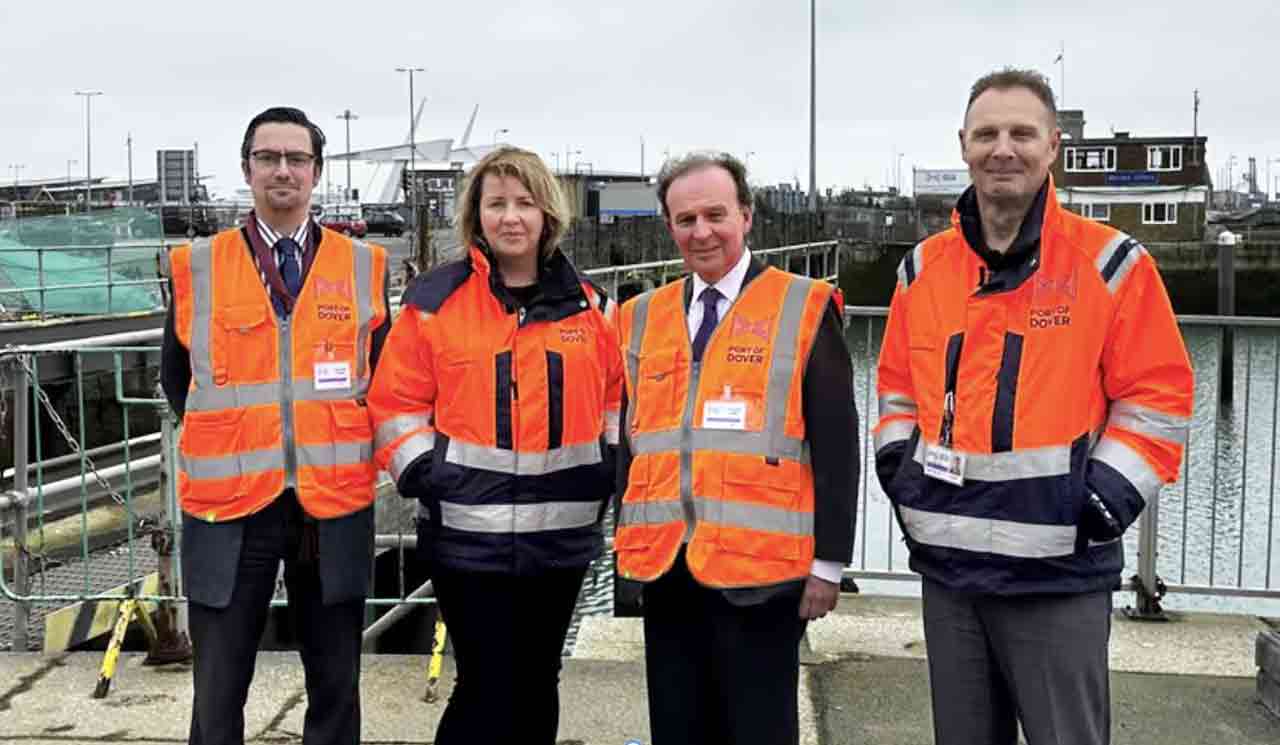KCC’s Roger Gough and Neil Baker with Emma Ward and Paul Biles from the Port of Dover Photo: KCC
In preparation for upcoming EU border ID checks, the Leader of Kent County Council (KCC) has been in talks with officers at the Port of Dover (PoD) with the aim to devise strategies that will minimize queues and ensure efficient movement of vehicles through the port.
These efforts come ahead of the anticipated implementation of the new system later this year.
Roger Gough and Cabinet Member for Highways and Transport, Neil Baker, were told that the planning to streamline the new EES (Entry Exit System) checks, by investing in new processing systems and holding areas, is well underway.
The new EES checks will require travellers from countries outside the EU to register biometrics such as facial and fingerprint scans at their first point of entry. All passengers in cars will have to be processed at the port, leading to potential delays.
Both Roger Gough and the CEO of the Port of Dover, Doug Bannister, continue to warn central government of the serious impact the new checks could have on tourists crossing the channel, with potential delays at the port causing a backlog of queuing traffic on routes leading to Dover.
“Seeing for myself the vast number of vehicles transporting goods through the port today really hits home the fact that, if Dover grinds to a halt when EES checks are introduced, the supply chain of the UK will be hit very badly indeed.”
Roger Gough said:
“The rapidly approaching introduction of EES checks presents a very real problem for the Port of Dover as there is limited space in the port to create extra capacity for registration zones and more check in areas.
” I have been reassured today with the work that the PoD have been developing to mitigate the impact on tourists crossing the Short Straights from Dover. The increase in the number of booths, enhanced staffing and the detailed modelling undertaken to determine the impact of the forecasted flows of traffic is well thought out and will be critical to allowing passengers and freight to pass through the border as quickly and effectively as possible. It will also help to mitigate the potential disruption in and around Dover.”
“I continue to urge central government to work with us, the port directors, and all partners in the Kent & Medway Resilience Forum (KMRF) to ensure all the infrastructure and resources are in place to prevent a standstill on the approach to Dover. They need to be strengthening our local transport networks urgently, putting in place more effective legislation and infrastructure, and doing everything they can to keep Kent moving.
“The Channel route is the most important entry to Europe for the whole of the UK. The visit to the Port of Dover today, where I have seen for myself the vast number of vehicles transporting goods through the port, really hits home the fact that if Dover grinds to a halt when these checks are introduced, the supply chain of the UK will be hit very badly indeed.”
Emma Ward, Chief Operations Officer at the Port of Dover, said:
“We are making progress ahead of the EU EES system coming into force in the Autumn, and it has been great to welcome Roger Gough here today to outline our plans.
“Of course the introduction of EES checks presents a huge challenge, but we are confident that the plans we are putting in place will ensure we can rise to that challenge.
“We will continue to process vehicles through the port in a very similar way to how we do it now. However, we are investing in new processes and operating areas and are working at great pace to have these in place by 6th October, which is when we have been told the new checks are likely to begin.
“There are two stages to the EES process. The first is registration, where passengers will have to have their passports checked and give biometric fingerprints and facial recognition. The second stage is to have those details validated when you cross the border.
“There is no getting away from the fact that this could be a slow process, especially if it involves a car full of people or a coach full of passengers. So we are looking at how these checks can be done in a location outside of the port itself, to prevent a backlog of queues on to surrounding roads.
“As a key partner of the KMRF, we continue to have robust conversations with the government, who need to support us in looking at new infrastructure, processes and technology that will ease the pressure on the port itself, along with pressing on with the urgent development of an app on which travellers can pre-register and not have to queue.”
KCC is continuing to press Government to take urgent actions, to ensure that the borders are free from disruption, with improved infrastructure, information, and intelligence, so that everyone travelling through Kent is kept safe, fully informed, and able to reach their destinations easily and without long delays.
